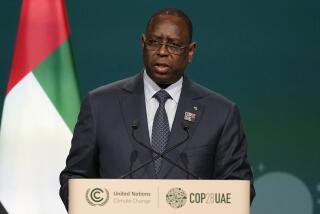Yemen’s leader calls for early vote
Yemeni President Ali Abdullah Saleh on Friday called for early elections, casting into doubt a deal brokered by a regional alliance that would have had him step down within a month, with immunity from prosecution.
“We call for an early presidential election in a democratic way, in order to avoid bloodshed,” Saleh said, speaking during what has become a regular post-prayers speech to thousands of supporters in the capital.
Saleh did not make clear when early elections might be held, whether he was accepting the deal brokered by the Gulf Cooperation Council or whether his offer was part of that deal or an alternate proposal.
The GCC plan called for Saleh to hand over power to his deputy and for presidential elections to be held within two months, well ahead of the balloting planned for September 2013. In exchange, the president, his family and his top aides would be granted immunity.
On Wednesday, the Yemeni leader refused to sign the agreement, sending the alliance’s envoy, Abdullatif bin Rashid Zayani, back to Saudi Arabia empty-handed for the second time in a month.
The following day, a spokesman said Saleh was willing to sign the plan. But as of Friday he had not done so.
The GCC envoy is expected to return Sunday to Sana, the Yemeni capital, so Saleh can sign a new agreement, presidential spokesman Ahmed Sufi said. “The president is ready at any time to sign,” he said.
On Friday, hundreds of thousands of Yemenis again took to the streets nationwide in protests both for and against Saleh, the 15th week of demonstrations. Saleh loyalists waved banners that read “Unity” and “May 22,” the latter referring to a national holiday commemorating the joining of northern and southern Yemen in 1990.
Antigovernment protesters, who rejected the latest GCC plan, remained skeptical Friday about Saleh’s willingness to step down.
“He is just playing for time,” said activist Qaid Shameeri, who joined a crowd of antigovernment protesters in western Sana. “This is typical of Saleh. He has done this before, and he will keep doing it to try and stay in power.”
The plan mediated by the gulf council has been backed by U.S. and European Union officials, who want to end unrest in the Arabian Peninsula state that has become a haven for Al Qaeda networks. In an address Thursday on the Middle East, President Obama called on Saleh to “follow through on his commitment to transfer power.”
Analysts said Saleh’s latest bid for elections is probably another ploy as he clings to power.
“The issue for him is to leave in a respected way, not a [Hosni] Mubarak way or a [Zine el Abidine] ben Ali way,” said Ibrahim Sharqieh, deputy director of the Brookings Doha Center, referring to the recently deposed leaders of Egypt and Tunisia. “He wants an honorable exit. That has been the major issue between him and the opposition. The GCC initiative does not guarantee that.”
An honorable exit would include immunity not just for Saleh’s inner circle, but for many members of his regime, Sharqieh said.
“He has people everywhere, in all government institutions, security apparatuses, everywhere,” he said, and that probably became a sticking point in negotiating the GCC agreement. “When the time came to sign, he was faced with this — what will happen to all of these people?”
Sharqieh said Saleh would probably support elections within months, not weeks. That, along with the widespread immunity Saleh is seeking for his compatriots, would be unpalatable to opposition leaders who want him ousted immediately.
“They want to see Saleh leave now because they don’t trust him,” Sharqieh said. “I highly doubt an early-elections proposal will bridge the gap between the two sides.”
Craig is a special correspondent. Times staff writer Molly Hennessy-Fiske in Cairo contributed to this report.
More to Read
Start your day right
Sign up for Essential California for news, features and recommendations from the L.A. Times and beyond in your inbox six days a week.
You may occasionally receive promotional content from the Los Angeles Times.





